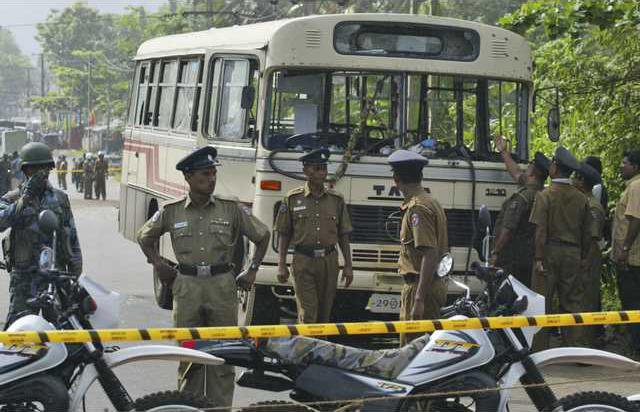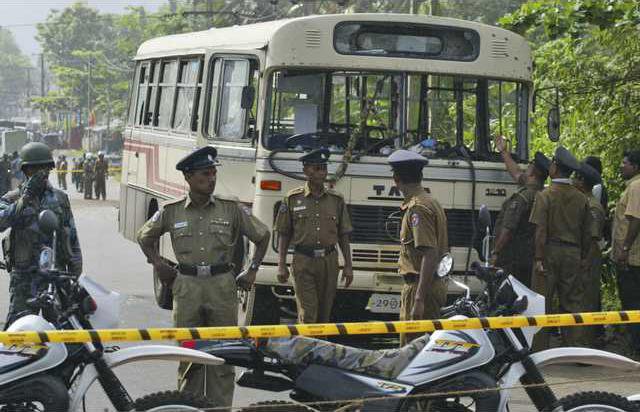COLOMBO, Sri Lanka — Bombs ripped through two buses in Sri Lanka on Friday, including one packed with morning commuters near the country’s heavily fortified capital, officials said. At least 23 people were killed and 67 wounded.
The attacks came two days after another bombing that targeted civilians in Colombo, and authorities promptly blamed the Tamil Tiger rebels, who have made such attacks a hallmark of their 25-year fight against Sri Lanka’s government.
If carried out by the rebels — who offered no immediate comment and routinely deny any role in such bombings — the attack would show their ability to strike deep inside government territory despite a maze of security checkpoints around the capital and its suburbs.
The first bomb was detonated on a roadside about 7:35 a.m. in the Colombo suburb of Moratuwa as a passenger bus went by, said military spokesman Brig. Udaya Nanayakkara. It killed 21 people and wounded 47 others.
He said that a curfew has been imposed in the area to give soldiers and police a chance to search for suspected rebels.
The explosion shattered the vehicle’s windows and peppered it with shrapnel. A 45-year old man who identified himself only as Nalaka said he was thrown from his motorcycle by the explosion.
‘‘When I got up I saw the bus and quickly got into it. Some people lay dead. Some others were bleeding,’’ he told AP Television News. ‘‘I heard somebody screaming ’help, help,’ and I rushed to him, but I could not move him because he was heavy.’’
Hours later, another blast occurred inside a bus in the hills of the central Kandy district, killing two passengers and wounding 20 other people, said police spokesman Ranjith Gunasekara.
The rebels, blamed for scores of suicide bombings and other attacks on civilians, are listed as a terrorist group by the United States, the European Union and India. They are believed to have been behind a blast Wednesday that wounded 19 people on a passenger train in Colombo.
After the first attack Friday, President Mahinda Rajapaksa called on Sri Lankans to ‘‘remain vigilant against the forces of terror.’’
With much of the fighting taking place hundreds of miles to the north, the recent attacks have shaken the south, home to Sri Lanka’s Sinhalese majority, and left residents fearful of more to come.
‘‘I don’t know how this war is being fought in the north. I see that only on the television. But, it now seems the war has come to the capital,’’ said Roshan Dhammika, a 30-year-old who drives a motorized rickshaw.
Meanwhile, the Defense Ministry said 17 rebels and five soldiers were killed Thursday in fighting surrounding the rebel stronghold in the north. The clashes occurred in Jaffna, Mannar, Vavuniya and Welioya districts, a military official said on condition of anonymity, citing government rules.
This week’s attacks appeared to also boost already strong support for the war among people in Colombo.
‘‘What else can you do against a ruthless terrorist group. The LTTE now wants to stop operations in the north as they are suffering defeats. That’s why they target civilians,’’ said Ganesh Wijenayake, a 45-year-old businessman in Colombo, using a common acronym for the insurgents.
The Tigers, formally known as the Liberation Tigers of Tamil Eelam, have fought since 1983 to create an independent homeland for Sri Lanka’s Tamil minority, which has been marginalized by successive governments controlled by the Sinhalese majority. More than 70,000 people have been killed.
Since a long-standing peace process broke down nearly two years ago, fighting between the Tigers and government forces has steadily escalated along the northern front lines and in the east, where the military last year overran rebel-controlled enclaves.
But the rebels still run a de facto state in much of northern Sri Lanka, and the government says it plans to completely crush the insurgents by the end of the year — a threat diplomats and other observers doubt Colombo has the ability to achieve.
Since the start of the year, more than 200 civilians have been killed by bombings in rebel and government territory, according to the U.N. Office for the Coordination of Humanitarian Affairs.
The attacks came two days after another bombing that targeted civilians in Colombo, and authorities promptly blamed the Tamil Tiger rebels, who have made such attacks a hallmark of their 25-year fight against Sri Lanka’s government.
If carried out by the rebels — who offered no immediate comment and routinely deny any role in such bombings — the attack would show their ability to strike deep inside government territory despite a maze of security checkpoints around the capital and its suburbs.
The first bomb was detonated on a roadside about 7:35 a.m. in the Colombo suburb of Moratuwa as a passenger bus went by, said military spokesman Brig. Udaya Nanayakkara. It killed 21 people and wounded 47 others.
He said that a curfew has been imposed in the area to give soldiers and police a chance to search for suspected rebels.
The explosion shattered the vehicle’s windows and peppered it with shrapnel. A 45-year old man who identified himself only as Nalaka said he was thrown from his motorcycle by the explosion.
‘‘When I got up I saw the bus and quickly got into it. Some people lay dead. Some others were bleeding,’’ he told AP Television News. ‘‘I heard somebody screaming ’help, help,’ and I rushed to him, but I could not move him because he was heavy.’’
Hours later, another blast occurred inside a bus in the hills of the central Kandy district, killing two passengers and wounding 20 other people, said police spokesman Ranjith Gunasekara.
The rebels, blamed for scores of suicide bombings and other attacks on civilians, are listed as a terrorist group by the United States, the European Union and India. They are believed to have been behind a blast Wednesday that wounded 19 people on a passenger train in Colombo.
After the first attack Friday, President Mahinda Rajapaksa called on Sri Lankans to ‘‘remain vigilant against the forces of terror.’’
With much of the fighting taking place hundreds of miles to the north, the recent attacks have shaken the south, home to Sri Lanka’s Sinhalese majority, and left residents fearful of more to come.
‘‘I don’t know how this war is being fought in the north. I see that only on the television. But, it now seems the war has come to the capital,’’ said Roshan Dhammika, a 30-year-old who drives a motorized rickshaw.
Meanwhile, the Defense Ministry said 17 rebels and five soldiers were killed Thursday in fighting surrounding the rebel stronghold in the north. The clashes occurred in Jaffna, Mannar, Vavuniya and Welioya districts, a military official said on condition of anonymity, citing government rules.
This week’s attacks appeared to also boost already strong support for the war among people in Colombo.
‘‘What else can you do against a ruthless terrorist group. The LTTE now wants to stop operations in the north as they are suffering defeats. That’s why they target civilians,’’ said Ganesh Wijenayake, a 45-year-old businessman in Colombo, using a common acronym for the insurgents.
The Tigers, formally known as the Liberation Tigers of Tamil Eelam, have fought since 1983 to create an independent homeland for Sri Lanka’s Tamil minority, which has been marginalized by successive governments controlled by the Sinhalese majority. More than 70,000 people have been killed.
Since a long-standing peace process broke down nearly two years ago, fighting between the Tigers and government forces has steadily escalated along the northern front lines and in the east, where the military last year overran rebel-controlled enclaves.
But the rebels still run a de facto state in much of northern Sri Lanka, and the government says it plans to completely crush the insurgents by the end of the year — a threat diplomats and other observers doubt Colombo has the ability to achieve.
Since the start of the year, more than 200 civilians have been killed by bombings in rebel and government territory, according to the U.N. Office for the Coordination of Humanitarian Affairs.

